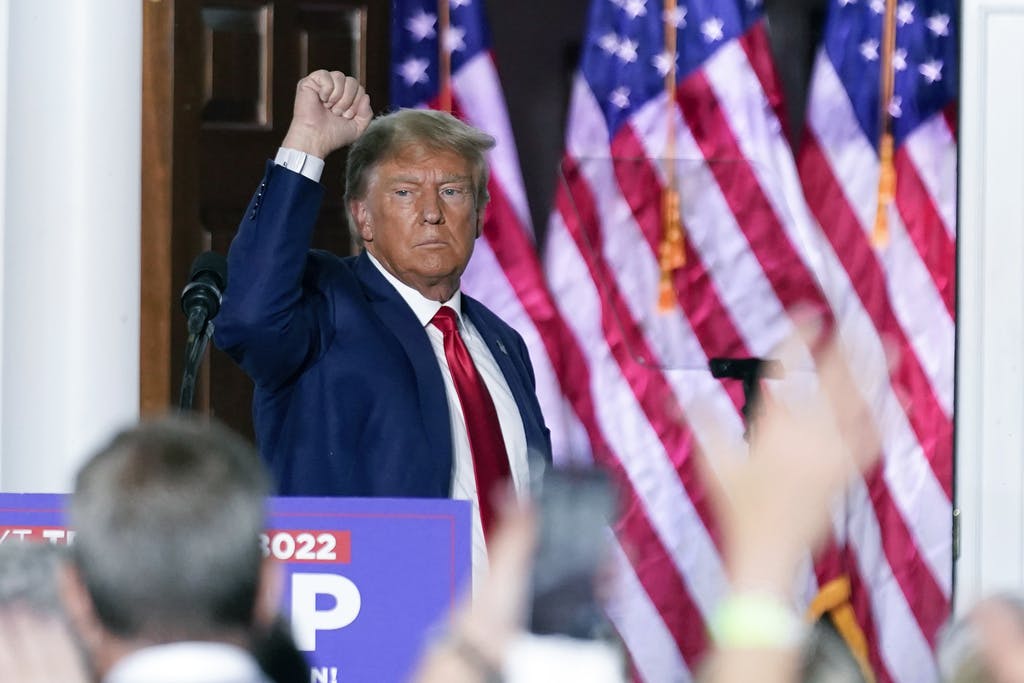Could Jack Smith Win a Trump Conviction by Trying Him at New Jersey Instead of GOP-Friendly Florida?
The former president’s Bedminster residence, where he purportedly held a particularly incriminating conversation, is another card in the special counsel’s prosecutorial hand.

The Trump National Golf Club Bedminster is just north of 1,200 miles from the gates of Mar-a-Lago, and it could emerge as a second site of legal peril for President Trump, who already faces a raft of criminal charges in Florida. Even greater danger, though, could lurk for Mr. Trump at New Jersey.
That possibility is ventured in the Atlantic by two attorneys, Ryan Goodman and Andrew Weissman. Mr. Weissman was the deputy for Special Counsel Robert Mueller during the investigation into Russian interference in the 2016 election. Messrs. Mueller and Weissman ultimately did not recommend charges against Mr. Trump.
In his book, “Where Law Ends: Inside the Mueller Investigation,” Mr. Weissman describes Mr. Trump as “lawless” and “an animal, clawing at the world with no concept of right and wrong.” He has said, “I would have had our report say that the president obstructed justice.”
The Atlantic’s 2016 endorsement of Hillary Clinton was under the headline, “Against Donald Trump.” It described Mr. Trump as “an enemy of fact-based discourse” and someone “ignorant of, and indifferent to, the Constitution.” Most damning for a magazine that numbers the sage Ralph Waldo Emerson and the author Harriet Beecher Stowe as founders, the editorial observed that Mr. Trump “appears not to read.”
The suggestion that Bedminster could serve as the predicate for a separate set of criminal charges underscores the high-stakes chess match that is emerging between Mr. Trump and the special counsel, Jack Smith. Mar-a-Lago could be the start, not the end, of Mr. Trump’s worries.
Before Mr. Smith lodged his 37-count indictment at a Miami federal courthouse, much of his attention appeared to be focused on the District of Columbia, where for months a grand jury had been mulling charges with respect to Mr. Trump’s removal of classified documents from the White House.
The special counsel’s decision to bring charges in Florida, though, is not without its handicaps for the former war crimes prosecutor. The jury pool is likely to be more sympathetic to their neighbor than a staunchly Democratic one in the nation’s capital would have been. In the 2020 election, Mr. Trump lost D.C. by more than 90 points.
Then there is the judge who was assigned, albeit randomly, to the case, Aileen Cannon, a jurist who was rated qualified by the American Bar Association and confirmed by a vote in the Senate of 56 to 21 but who has limited trial experience.
The judge’s previous rulings in favor of Mr. Trump’s request for a special master were brusquely reversed by a panel of riders of the 11th appeals circuit, which accused her of “a radical reordering of our case law.” Mr. Smith may worry what Judge Cannon might do should she sit for the whole trial.
New Jersey, though, could offer Mr. Smith something like a prosecutorial trifecta. President Biden beat Mr. Trump at Somerset by 20 percentage points in the last election, garnering the largest share of the vote for a Democrat since President Johnson in 1964. Judge Cannon would be a safe distance away.
The outlines of a case that clicks into focus at Bedminster are already visible, and the charges that Mr. Smith could levy there are more serious than even those he has already brought below the Mason-Dixon line. The first two incidents described in the Mar-a-Lago indictment both took place at Bedminster.
They involve occasions where Mr. Trump allegedly “showed classified documents to others.” The first was a “highly confidential” “plan of attack,” widely thought to be the blueprint for a strike against Iran. On a recording, Mr. Trump is purportedly heard to allow that as “president I could have declassified it,” but, “Now, I can’t, you know, but this is still a secret.”
The second was a “classified map related to a military operation” that Mr. Trump allegedly showed to a representative of his political action committee. The indictment reports that he warned that representative “not to get too close” and acknowledged that he should not be showing such a record to someone who “did not possess a security clearance.”
Mr. Trump has thus far been charged only with the retention of classified materials, not their dissemination. While that too can have a Florida address, the law allows, “Any offense against the United States begun in one district and completed in another” to be charged in either. So it could be that Mr. Smith is keeping Bedminster charges in reserve.
If the special counsel attempted to bring charges relating to the two Bedminster incidents in Florida and failed — the Supreme Court has ruled that venue “must be determined from the nature of the crime alleged and the location of the act or acts constituting it” — then he could be precluded from bringing them again.
Two criminal statutes could provide the core of a potential Bedminster indictment. The first, 18 U.S. Code § 793, makes it a crime to intentionally communicate national-defense information to those without authorization. The second, 18 U.S. Code §798, makes it a crime to do the same for classified materials of all stripes.
While Bedminster, with a judge and jury pool potentially favorable to Mr. Smith and its status as setting for two of the colloquies at the core of Mr. Smith’s case, could be an attractive place to bring charges, the special counsel would have to ensure that he can build a tri-state area indictment that could stand independently of any Mar-a-Lago ballast.
The special counsel’s margin for error, though, potentially got wider on account of a Supreme Court decision that came down Thursday morning. Justice Samuel Alito, writing for an unanimous court, held that when a “conviction is reversed because the prosecution occurred in the wrong venue,” a retrial is allowed.

